Cyber Security
Inside a Dark Adtech Empire Fed by Fake CAPTCHAs – Krebs on Security
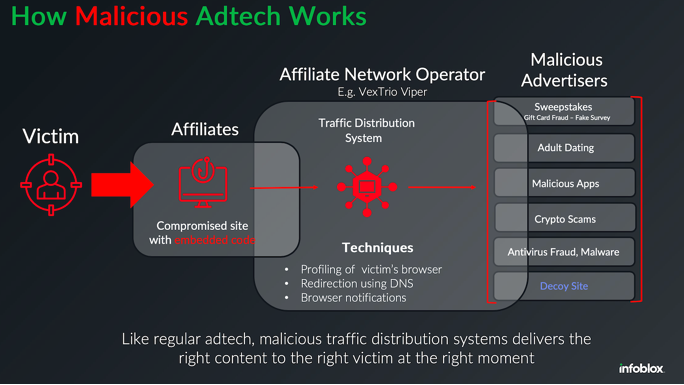
Late last year, security researchers made a startling discovery: Kremlin-backed disinformation campaigns were bypassing moderation on social media platforms by leveraging the same malicious advertising technology that powers a sprawling ecosystem of online hucksters and website hackers. A new report on the fallout from that investigation finds this dark ad tech industry is far more resilient and incestuous than previously known.
Image: Infoblox.
In November 2024, researchers at the security firm Qurium published an investigation into “Doppelganger,” a disinformation network that promotes pro-Russian narratives and infiltrates Europe’s media landscape by pushing fake news through a network of cloned websites.
Doppelganger campaigns use specialized links that bounce the visitor’s browser through a long series of domains before the fake news content is served. Qurium found Doppelganger relies on a sophisticated “domain cloaking” service, a technology that allows websites to present different content to search engines compared to what regular visitors see. The use of cloaking services helps the disinformation sites remain online longer than they otherwise would, while ensuring that only the targeted audience gets to view the intended content.
Qurium discovered that Doppelganger’s cloaking service also promoted online dating sites, and shared much of the same infrastructure with VexTrio, which is thought to be the oldest malicious traffic distribution system (TDS) in existence. While TDSs are commonly used by legitimate advertising networks to manage traffic from disparate sources and to track who or what is behind each click, VexTrio’s TDS largely manages web traffic from victims of phishing, malware, and social engineering scams.
BREAKING BAD
Digging deeper, Qurium noticed Doppelganger’s cloaking service used an Internet provider in Switzerland as the first entry point in a chain of domain redirections. They also noticed the same infrastructure hosted a pair of co-branded affiliate marketing services that were driving traffic to sketchy adult dating sites: LosPollos[.]com and TacoLoco[.]co.
The LosPollos ad network incorporates many elements and references from the hit series “Breaking Bad,” mirroring the fictional “Los Pollos Hermanos” restaurant chain that served as a money laundering operation for a violent methamphetamine cartel.

The LosPollos advertising network invokes characters and themes from the hit show Breaking Bad. The logo for LosPollos (upper left) is the image of Gustavo Fring, the fictional chicken restaurant chain owner in the show.
Affiliates who sign up with LosPollos are given JavaScript-heavy “smartlinks” that drive traffic into the VexTrio TDS, which in turn distributes the traffic among a variety of advertising partners, including dating services, sweepstakes offers, bait-and-switch mobile apps, financial scams and malware download sites.
LosPollos affiliates typically stitch these smart links into WordPress websites that have been hacked via known vulnerabilities, and those affiliates will earn a small commission each time an Internet user referred by any of their hacked sites falls for one of these lures.

The Los Pollos advertising network promoting itself on LinkedIn.
According to Qurium, TacoLoco is a traffic monetization network that uses deceptive tactics to trick Internet users into enabling “push notifications,” a cross-platform browser standard that allows websites to show pop-up messages which appear outside of the browser. For example, on Microsoft Windows systems these notifications typically show up in the bottom right corner of the screen — just above the system clock.
In the case of VexTrio and TacoLoco, the notification approval requests themselves are deceptive — disguised as “CAPTCHA” challenges designed to distinguish automated bot traffic from real visitors. For years, VexTrio and its partners have successfully tricked countless users into enabling these site notifications, which are then used to continuously pepper the victim’s device with a variety of phony virus alerts and misleading pop-up messages.

Examples of VexTrio landing pages that lead users to accept push notifications on their device.
According to a December 2024 annual report from GoDaddy, nearly 40 percent of compromised websites in 2024 redirected visitors to VexTrio via LosPollos smartlinks.
ADSPRO AND TEKNOLOGY
On November 14, 2024, Qurium published research to support its findings that LosPollos and TacoLoco were services operated by Adspro Group, a company registered in the Czech Republic and Russia, and that Adspro runs its infrastructure at the Swiss hosting providers C41 and Teknology SA.
Qurium noted the LosPollos and TacoLoco sites state that their content is copyrighted by ByteCore AG and SkyForge Digital AG, both Swiss firms that are run by the owner of Teknology SA, Giulio Vitorrio Leonardo Cerutti. Further investigation revealed LosPollos and TacoLoco were apps developed by a company called Holacode, which lists Cerutti as its CEO.
The apps marketed by Holacode include numerous VPN services, as well as one called Spamshield that claims to stop unwanted push notifications. But in January, Infoblox said they tested the app on their own mobile devices, and found it hides the user’s notifications, and then after 24 hours stops hiding them and demands payment. Spamshield subsequently changed its developer name from Holacode to ApLabz, although Infoblox noted that the Terms of Service for several of the rebranded ApLabz apps still referenced Holacode in their terms of service.
Incredibly, Cerutti threatened to sue me for defamation before I’d even uttered his name or sent him a request for comment (Cerutti sent the unsolicited legal threat back in January after his company and my name were merely tagged in an Infoblox post on LinkedIn about VexTrio).
Asked to comment on the findings by Qurium and Infoblox, Cerutti vehemently denied being associated with VexTrio. Cerutti asserted that his companies all strictly adhere to the regulations of the countries in which they operate, and that they have been completely transparent about all of their operations.
“We are a group operating in the advertising and marketing space, with an affiliate network program,” Cerutti responded. “I am not [going] to say we are perfect, but I strongly declare we have no connection with VexTrio at all.”
“Unfortunately, as a big player in this space we also get to deal with plenty of publisher fraud, sketchy traffic, fake clicks, bots, hacked, listed and resold publisher accounts, etc, etc.,” Cerutti continued. “We bleed lots of money to such malpractices and conduct regular internal screenings and audits in a constant battle to remove bad traffic sources. It is also a highly competitive space, where some upstarts will often play dirty against more established mainstream players like us.”
Working with Qurium, researchers at the security firm Infoblox released details about VexTrio’s infrastructure to their industry partners. Just four days after Qurium published its findings, LosPollos announced it was suspending its push monetization service. Less than a month later, Adspro had rebranded to Aimed Global.
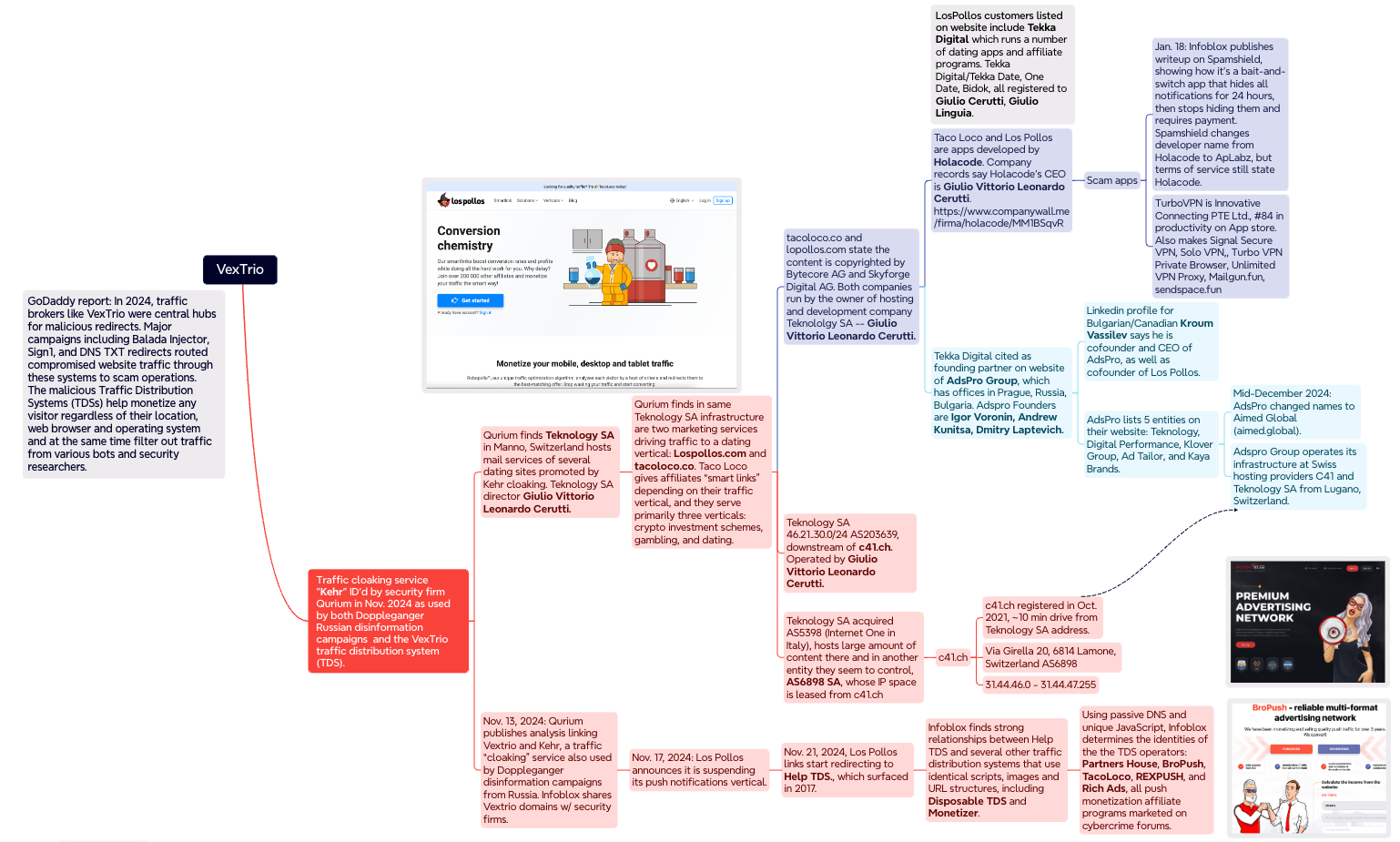
A mind map illustrating some of the key findings and connections in the Infoblox and Qurium investigations. Click to enlarge.
A REVEALING PIVOT
In March 2025, researchers at GoDaddy chronicled how DollyWay — a malware strain that has consistently redirected victims to VexTrio throughout its eight years of activity — suddenly stopped doing that on November 20, 2024. Virtually overnight, DollyWay and several other malware families that had previously used VexTrio began pushing their traffic through another TDS called Help TDS.
Digging further into historical DNS records and the unique code scripts used by the Help TDS, Infoblox determined it has long enjoyed an exclusive relationship with VexTrio (at least until LosPollos ended its push monetization service in November).
In a report released today, Infoblox said an exhaustive analysis of the JavaScript code, website lures, smartlinks and DNS patterns used by VexTrio and Help TDS linked them with at least four other TDS operators (not counting TacoLoco). Those four entities — Partners House, BroPush, RichAds and RexPush — are all Russia-based push monetization programs that pay affiliates to drive signups for a variety of schemes, but mostly online dating services.
“As Los Pollos push monetization ended, we’ve seen an increase in fake CAPTCHAs that drive user acceptance of push notifications, particularly from Partners House,” the Infoblox report reads. “The relationship of these commercial entities remains a mystery; while they are certainly long-time partners redirecting traffic to one another, and they all have a Russian nexus, there is no overt common ownership.”
Renee Burton, vice president of threat intelligence at Infoblox, said the security industry generally treats the deceptive methods used by VexTrio and other malicious TDSs as a kind of legally grey area that is mostly associated with less dangerous security threats, such as adware and scareware.
But Burton argues that this view is myopic, and helps perpetuate a dark adtech industry that also pushes plenty of straight-up malware, noting that hundreds of thousands of compromised websites around the world every year redirect victims to the tangled web of VexTrio and VexTrio-affiliate TDSs.
“These TDSs are a nefarious threat, because they’re the ones you can connect to the delivery of things like information stealers and scams that cost consumers billions of dollars a year,” Burton said. “From a larger strategic perspective, my takeaway is that Russian organized crime has control of malicious adtech, and these are just some of the many groups involved.”
WHAT CAN YOU DO?
As KrebsOnSecurity warned way back in 2020, it’s a good idea to be very sparing in approving notifications when browsing the Web. In many cases these notifications are benign, but as we’ve seen there are numerous dodgy firms that are paying site owners to install their notification scripts, and then reselling that communications pathway to scammers and online hucksters.
If you’d like to prevent sites from ever presenting notification requests, all of the major browser makers let you do this — either across the board or on a per-website basis. While it is true that blocking notifications entirely can break the functionality of some websites, doing this for any devices you manage on behalf of your less tech-savvy friends or family members might end up saving everyone a lot of headache down the road.
To modify site notification settings in Mozilla Firefox, navigate to Settings, Privacy & Security, Permissions, and click the “Settings” tab next to “Notifications.” That page will display any notifications already permitted and allow you to edit or delete any entries. Tick the box next to “Block new requests asking to allow notifications” to stop them altogether.
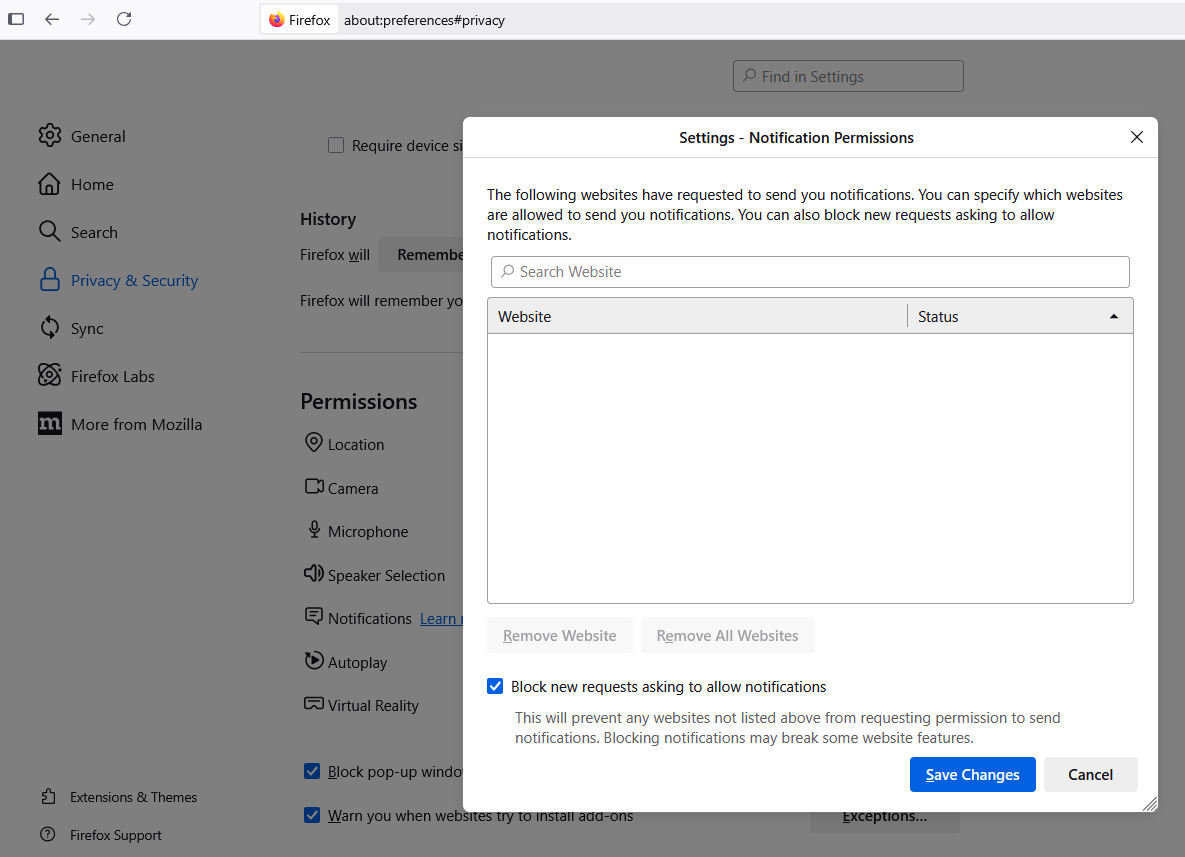
In Google Chrome, click the icon with the three dots to the right of the address bar, scroll all the way down to Settings, Privacy and Security, Site Settings, and Notifications. Select the “Don’t allow sites to send notifications” button if you want to banish notification requests forever.
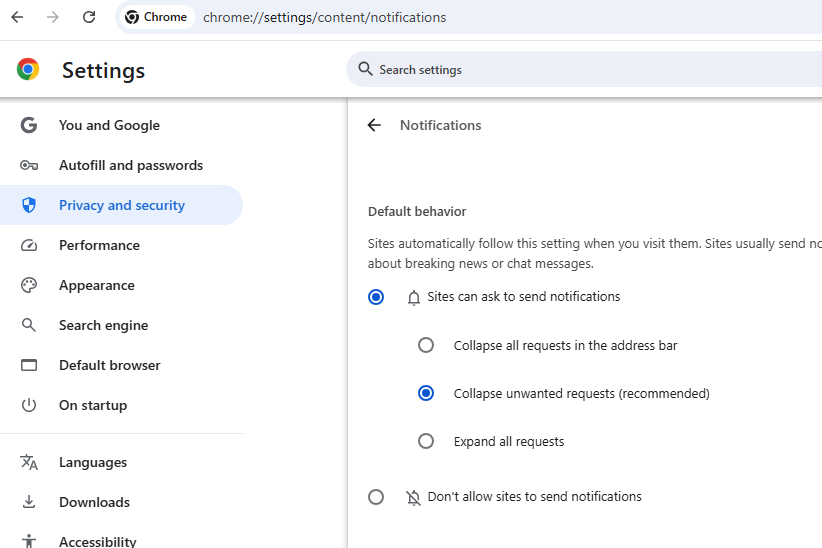
In Apple’s Safari browser, go to Settings, Websites, and click on Notifications in the sidebar. Uncheck the option to “allow websites to ask for permission to send notifications” if you wish to turn off notification requests entirely.
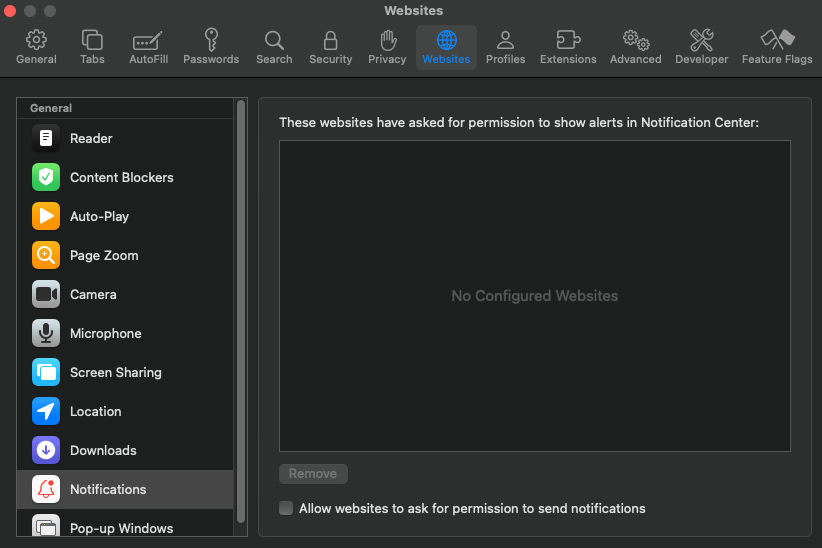
Cyber Security
Scammers Unleash Flood of Slick Online Gaming Sites – Krebs on Security

Fraudsters are flooding Discord and other social media platforms with ads for hundreds of polished online gaming and wagering websites that lure people with free credits and eventually abscond with any cryptocurrency funds deposited by players. Here’s a closer look at the social engineering tactics and remarkable traits of this sprawling network of more than 1,200 scam sites.
The scam begins with deceptive ads posted on social media that claim the wagering sites are working in partnership with popular social media personalities, such as Mr. Beast, who recently launched a gaming business called Beast Games. The ads invariably state that by using a supplied “promo code,” interested players can claim a $2,500 credit on the advertised gaming website.
An ad posted to a Discord channel for a scam gambling website that the proprietors falsely claim was operating in collaboration with the Internet personality Mr. Beast. Image: Reddit.com.
The gaming sites all require users to create a free account to claim their $2,500 credit, which they can use to play any number of extremely polished video games that ask users to bet on each action. At the scam website gamblerbeast[.]com, for example, visitors can pick from dozens of games like B-Ball Blitz, in which you play a basketball pro who is taking shots from the free throw line against a single opponent, and you bet on your ability to sink each shot.
The financial part of this scam begins when users try to cash out any “winnings.” At that point, the gaming site will reject the request and prompt the user to make a “verification deposit” of cryptocurrency — typically around $100 — before any money can be distributed. Those who deposit cryptocurrency funds are soon asked for additional payments.
However, any “winnings” displayed by these gaming sites are a complete fantasy, and players who deposit cryptocurrency funds will never see that money again. Compounding the problem, victims likely will soon be peppered with come-ons from “recovery experts” who peddle dubious claims on social media networks about being able to retrieve funds lost to such scams.
KrebsOnSecurity first learned about this network of phony betting sites from a Discord user who asked to be identified only by their screen name: “Thereallo” is a 17-year-old developer who operates multiple Discord servers and said they began digging deeper after users started complaining of being inundated with misleading spam messages promoting the sites.
“We were being spammed relentlessly by these scam posts from compromised or purchased [Discord] accounts,” Thereallo said. “I got frustrated with just banning and deleting, so I started to investigate the infrastructure behind the scam messages. This is not a one-off site, it’s a scalable criminal enterprise with a clear playbook, technical fingerprints, and financial infrastructure.”
After comparing the code on the gaming sites promoted via spam messages, Thereallo found they all invoked the same API key for an online chatbot that appears to be in limited use or else is custom-made. Indeed, a scan for that API key at the threat hunting platform Silent Push reveals at least 1,270 recently-registered and active domains whose names all invoke some type of gaming or wagering theme.
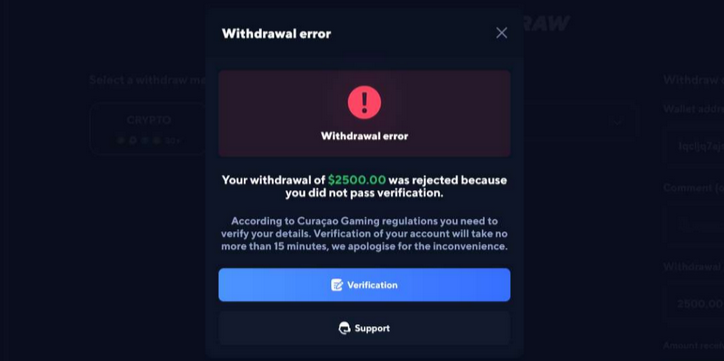
The “verification deposit” stage of the scam requires the user to deposit cryptocurrency in order to withdraw their “winnings.”
Thereallo said the operators of this scam empire appear to generate a unique Bitcoin wallet for each gaming domain they deploy.
“This is a decoy wallet,” Thereallo explained. “Once the victim deposits funds, they are never able to withdraw any money. Any attempts to contact the ‘Live Support’ are handled by a combination of AI and human operators who eventually block the user. The chat system is self-hosted, making it difficult to report to third-party service providers.”
Thereallo discovered another feature common to all of these scam gambling sites [hereafter referred to simply as “scambling” sites]: If you register at one of them and then very quickly try to register at a sister property of theirs from the same Internet address and device, the registration request is denied at the second site.
“I registered on one site, then hopped to another to register again,” Thereallo said. Instead, the second site returned an error stating that a new account couldn’t be created for another 10 minutes.

The scam gaming site spinora dot cc shares the same chatbot API as more than 1,200 similar fake gaming sites.
“They’re tracking my VPN IP across their entire network,” Thereallo explained. “My password manager also proved it. It tried to use my dummy email on a site I had never visited, and the site told me the account already existed. So it’s definitely one entity running a single platform with 1,200+ different domain names as front-ends. This explains how their support works, a central pool of agents handling all the sites. It also explains why they’re so strict about not giving out wallet addresses; it’s a network-wide policy.”
In many ways, these scambling sites borrow from the playbook of “pig butchering” schemes, a rampant and far more elaborate crime in which people are gradually lured by flirtatious strangers online into investing in fraudulent cryptocurrency trading platforms.
Pig butchering scams are typically powered by people in Asia who have been kidnapped and threatened with physical harm or worse unless they sit in a cubicle and scam Westerners on the Internet all day. In contrast, these scambling sites tend to steal far less money from individual victims, but their cookie-cutter nature and automated support components may enable their operators to extract payments from a large number of people in far less time, and with considerably less risk and up-front investment.
Silent Push’s Zach Edwards said the proprietors of this scambling empire are spending big money to make the sites look and feel like some fancy new type of casino.
“That’s a very odd type of pig butchering network and not like what we typically see, with much lower investments in the sites and lures,” Edwards said.
Here is a list of all domains that Silent Push found were using the scambling network’s chat API.
Cyber Security
Phishers Target Aviation Execs to Scam Customers – Krebs on Security

KrebsOnSecurity recently heard from a reader whose boss’s email account got phished and was used to trick one of the company’s customers into sending a large payment to scammers. An investigation into the attacker’s infrastructure points to a long-running Nigerian cybercrime ring that is actively targeting established companies in the transportation and aviation industries.
Image: Shutterstock, Mr. Teerapon Tiuekhom.
A reader who works in the transportation industry sent a tip about a recent successful phishing campaign that tricked an executive at the company into entering their credentials at a fake Microsoft 365 login page. From there, the attackers quickly mined the executive’s inbox for past communications about invoices, copying and modifying some of those messages with new invoice demands that were sent to some of the company’s customers and partners.
Speaking on condition of anonymity, the reader said the resulting phishing emails to customers came from a newly registered domain name that was remarkably similar to their employer’s domain, and that at least one of their customers fell for the ruse and paid a phony invoice. They said the attackers had spun up a look-alike domain just a few hours after the executive’s inbox credentials were phished, and that the scam resulted in a customer suffering a six-figure financial loss.
The reader also shared that the email addresses in the registration records for the imposter domain — roomservice801@gmail.com — is tied to many such phishing domains. Indeed, a search on this email address at DomainTools.com finds it is associated with at least 240 domains registered in 2024 or 2025. Virtually all of them mimic legitimate domains for companies in the aerospace and transportation industries worldwide.
An Internet search for this email address reveals a humorous blog post from 2020 on the Russian forum hackware[.]ru, which found roomservice801@gmail.com was tied to a phishing attack that used the lure of phony invoices to trick the recipient into logging in at a fake Microsoft login page. We’ll come back to this research in a moment.
JUSTY JOHN
DomainTools shows that some of the early domains registered to roomservice801@gmail.com in 2016 include other useful information. For example, the WHOIS records for alhhomaidhicentre[.]biz reference the technical contact of “Justy John” and the email address justyjohn50@yahoo.com.
A search at DomainTools found justyjohn50@yahoo.com has been registering one-off phishing domains since at least 2012. At this point, I was convinced that some security company surely had already published an analysis of this particular threat group, but I didn’t yet have enough information to draw any solid conclusions.
DomainTools says the Justy John email address is tied to more than two dozen domains registered since 2012, but we can find hundreds more phishing domains and related email addresses simply by pivoting on details in the registration records for these Justy John domains. For example, the street address used by the Justy John domain axisupdate[.]net — 7902 Pelleaux Road in Knoxville, TN — also appears in the registration records for accountauthenticate[.]com, acctlogin[.]biz, and loginaccount[.]biz, all of which at one point included the email address rsmith60646@gmail.com.
That Rsmith Gmail address is connected to the 2012 phishing domain alibala[.]biz (one character off of the Chinese e-commerce giant alibaba.com, with a different top-level domain of .biz). A search in DomainTools on the phone number in those domain records — 1.7736491613 — reveals even more phishing domains as well as the Nigerian phone number “2348062918302” and the email address michsmith59@gmail.com.
DomainTools shows michsmith59@gmail.com appears in the registration records for the domain seltrock[.]com, which was used in the phishing attack documented in the 2020 Russian blog post mentioned earlier. At this point, we are just two steps away from identifying the threat actor group.
The same Nigerian phone number shows up in dozens of domain registrations that reference the email address sebastinekelly69@gmail.com, including 26i3[.]net, costamere[.]com, danagruop[.]us, and dividrilling[.]com. A Web search on any of those domains finds they were indexed in an “indicator of compromise” list on GitHub maintained by Palo Alto Networks‘ Unit 42 research team.
SILVERTERRIER
According to Unit 42, the domains are the handiwork of a vast cybercrime group based in Nigeria that it dubbed “SilverTerrier” back in 2014. In an October 2021 report, Palo Alto said SilverTerrier excels at so-called “business e-mail compromise” or BEC scams, which target legitimate business email accounts through social engineering or computer intrusion activities. BEC criminals use that access to initiate or redirect the transfer of business funds for personal gain.
Palo Alto says SilverTerrier encompasses hundreds of BEC fraudsters, some of whom have been arrested in various international law enforcement operations by Interpol. In 2022, Interpol and the Nigeria Police Force arrested 11 alleged SilverTerrier members, including a prominent SilverTerrier leader who’d been flaunting his wealth on social media for years. Unfortunately, the lure of easy money, endemic poverty and corruption, and low barriers to entry for cybercrime in Nigeria conspire to provide a constant stream of new recruits.
BEC scams were the 7th most reported crime tracked by the FBI’s Internet Crime Complaint Center (IC3) in 2024, generating more than 21,000 complaints. However, BEC scams were the second most costly form of cybercrime reported to the feds last year, with nearly $2.8 billion in claimed losses. In its 2025 Fraud and Control Survey Report, the Association for Financial Professionals found 63 percent of organizations experienced a BEC last year.
Poking at some of the email addresses that spool out from this research reveals a number of Facebook accounts for people residing in Nigeria or in the United Arab Emirates, many of whom do not appear to have tried to mask their real-life identities. Palo Alto’s Unit 42 researchers reached a similar conclusion, noting that although a small subset of these crooks went to great lengths to conceal their identities, it was usually simple to learn their identities on social media accounts and the major messaging services.
Palo Alto said BEC actors have become far more organized over time, and that while it remains easy to find actors working as a group, the practice of using one phone number, email address or alias to register malicious infrastructure in support of multiple actors has made it far more time consuming (but not impossible) for cybersecurity and law enforcement organizations to sort out which actors committed specific crimes.
“We continue to find that SilverTerrier actors, regardless of geographical location, are often connected through only a few degrees of separation on social media platforms,” the researchers wrote.
FINANCIAL FRAUD KILL CHAIN
Palo Alto has published a useful list of recommendations that organizations can adopt to minimize the incidence and impact of BEC attacks. Many of those tips are prophylactic, such as conducting regular employee security training and reviewing network security policies.
But one recommendation — getting familiar with a process known as the “financial fraud kill chain” or FFKC — bears specific mention because it offers the single best hope for BEC victims who are seeking to claw back payments made to fraudsters, and yet far too many victims don’t know it exists until it is too late.
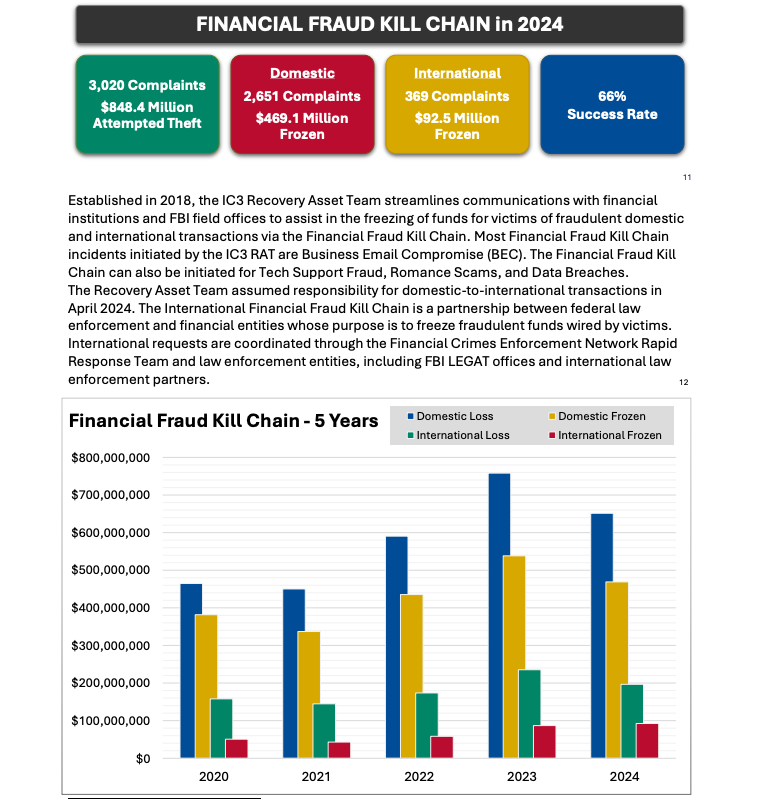
Image: ic3.gov.
As explained in this FBI primer, the International Financial Fraud Kill Chain is a partnership between federal law enforcement and financial entities whose purpose is to freeze fraudulent funds wired by victims. According to the FBI, viable victim complaints filed with ic3.gov promptly after a fraudulent transfer (generally less than 72 hours) will be automatically triaged by the Financial Crimes Enforcement Network (FinCEN).
The FBI noted in its IC3 annual report (PDF) that the FFKC had a 66 percent success rate in 2024. Viable ic3.gov complaints involve losses of at least $50,000, and include all records from the victim or victim bank, as well as a completed FFKC form (provided by FinCEN) containing victim information, recipient information, bank names, account numbers, location, SWIFT, and any additional information.
Cyber Security
Microsoft Fix Targets Attacks on SharePoint Zero-Day – Krebs on Security

On Sunday, July 20, Microsoft Corp. issued an emergency security update for a vulnerability in SharePoint Server that is actively being exploited to compromise vulnerable organizations. The patch comes amid reports that malicious hackers have used the SharePoint flaw to breach U.S. federal and state agencies, universities, and energy companies.
Image: Shutterstock, by Ascannio.
In an advisory about the SharePoint security hole, a.k.a. CVE-2025-53770, Microsoft said it is aware of active attacks targeting on-premises SharePoint Server customers and exploiting vulnerabilities that were only partially addressed by the July 8, 2025 security update.
The Cybersecurity & Infrastructure Security Agency (CISA) concurred, saying CVE-2025-53770 is a variant on a flaw Microsoft patched earlier this month (CVE-2025-49706). Microsoft notes the weakness applies only to SharePoint Servers that organizations use in-house, and that SharePoint Online and Microsoft 365 are not affected.
The Washington Post reported on Sunday that the U.S. government and partners in Canada and Australia are investigating the hack of SharePoint servers, which provide a platform for sharing and managing documents. The Post reports at least two U.S. federal agencies have seen their servers breached via the SharePoint vulnerability.
According to CISA, attackers exploiting the newly-discovered flaw are retrofitting compromised servers with a backdoor dubbed “ToolShell” that provides unauthenticated, remote access to systems. CISA said ToolShell enables attackers to fully access SharePoint content — including file systems and internal configurations — and execute code over the network.
Researchers at Eye Security said they first spotted large-scale exploitation of the SharePoint flaw on July 18, 2025, and soon found dozens of separate servers compromised by the bug and infected with ToolShell. In a blog post, the researchers said the attacks sought to steal SharePoint server ASP.NET machine keys.
“These keys can be used to facilitate further attacks, even at a later date,” Eye Security warned. “It is critical that affected servers rotate SharePoint server ASP.NET machine keys and restart IIS on all SharePoint servers. Patching alone is not enough. We strongly advise defenders not to wait for a vendor fix before taking action. This threat is already operational and spreading rapidly.”
Microsoft’s advisory says the company has issued updates for SharePoint Server Subscription Edition and SharePoint Server 2019, but that it is still working on updates for supported versions of SharePoint 2019 and SharePoint 2016.
CISA advises vulnerable organizations to enable the anti-malware scan interface (AMSI) in SharePoint, to deploy Microsoft Defender AV on all SharePoint servers, and to disconnect affected products from the public-facing Internet until an official patch is available.
The security firm Rapid7 notes that Microsoft has described CVE-2025-53770 as related to a previous vulnerability — CVE-2025-49704, patched earlier this month — and that CVE-2025-49704 was part of an exploit chain demonstrated at the Pwn2Own hacking competition in May 2025. That exploit chain invoked a second SharePoint weakness — CVE-2025-49706 — which Microsoft unsuccessfully tried to fix in this month’s Patch Tuesday.
Microsoft also has issued a patch for a related SharePoint vulnerability — CVE-2025-53771; Microsoft says there are no signs of active attacks on CVE-2025-53771, and that the patch is to provide more robust protections than the update for CVE-2025-49706.
This is a rapidly developing story. Any updates will be noted with timestamps.

 Fintech1 week ago
Fintech1 week agoOpenAI and UK Government Partner on AI Infrastructure and Deployment

 Latest Tech News2 weeks ago
Latest Tech News2 weeks agoThe tech that the US Post Office gave us

 Cyber Security1 week ago
Cyber Security1 week agoMicrosoft Fix Targets Attacks on SharePoint Zero-Day – Krebs on Security

 Latest Tech News1 week ago
Latest Tech News1 week agoTrump wanted to break up Nvidia — but then its CEO won him over

 Artificial Intelligence2 weeks ago
Artificial Intelligence2 weeks agoApple loses key AI leader to Meta

 Cyber Security1 week ago
Cyber Security1 week agoPhishers Target Aviation Execs to Scam Customers – Krebs on Security

 Latest Tech News6 days ago
Latest Tech News6 days agoGPD’s monster Strix Halo handheld requires a battery ‘backpack’ or a 180W charger

 Artificial Intelligence1 week ago
Artificial Intelligence1 week agoWhy Apple is playing it slow with AI

















